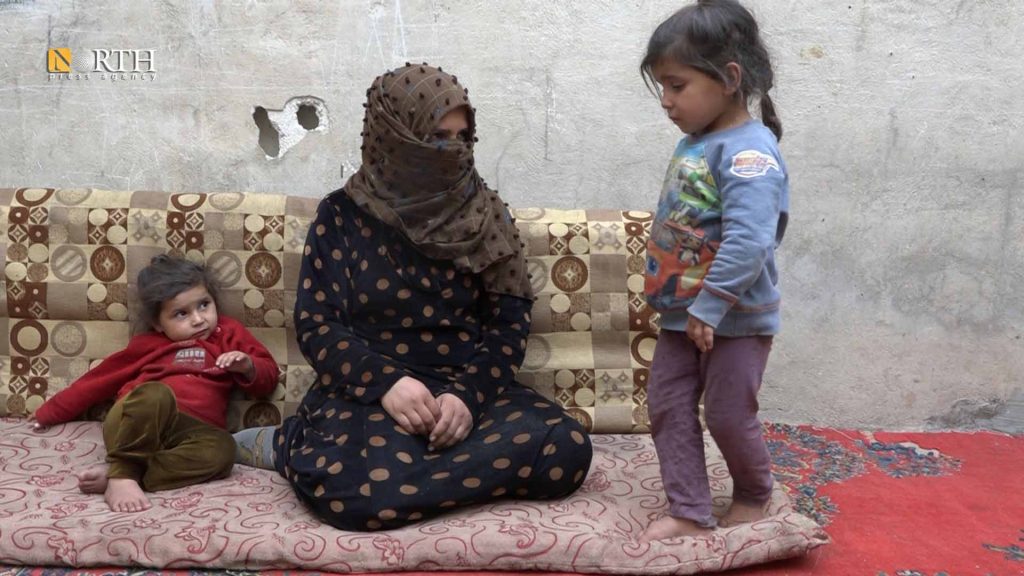Woman in Syria’s Raqqa anguished by father, brother’s killed by ISIS during Ramadan
RAQQA, Syria (North Press) – Fadila al-Ahmad, a 25-year-old woman from Syria’s northern city of Raqqa, misses her father and brother every year in the holy month of Ramadan, wishing to visit her loved ones’ graves to complain about the suffering they are going through following their absence.
Al-Ahmad remembers well when the Islamic State (ISIS) members stormed the family’s house in al-Sabkha city, 50 km southeast of Raqqa in 2015. They took her father, then aged 50, and her brother, then aged 35, to a detention center.
In 2014, ISIS captured the Syrian cities of Raqqa, Aleppo and Deir ez-Zor and their countryside declaring an Islamic Caliphate in large swaths in several Syrian and Iraqi areas and announcing Syria’s Raqqa as the capital of the Islamic Caliphate and headquarters of ISIS.
Al-Ahmad’s family headed to every official ISIS center with a view to release the two men, but in vain. ISIS refused to release them.
Covering her face with a veil and surrounded by her own children, al-Ahmad told North Press that the family kept reviewing ISIS centers to ask about the men but ISIS members kept telling them the men were arrested just for investigation and that they would be released on the first day of Eid al-Fitr.
Infidelity an blasphemy
Days after the arrest, ISIS members told the family that the father and the brother were proved to be operatives of the Syrian government and that they were infidels, adding they are doomed to be killed in a short time.
The holy month of Ramadan 2015 was tough for al-Ahmad’s family. They lived 45 days in fear and worry for the fate of the father and the brother. They hoped ISIS wouldn’t kill them.
On the eve of the Eid al-Fitr, the last day of Ramadan, ISIS announced the implementation of the death penalty for the two men and refused to tell the family about the place of their burial.
Al-Ahmad said she hoped the bodies of her father and brother were handed over so they would be buried in the city’s cemetery and their grave to be visited.
ISIS left behind dozens of mass graves in the Syrian territories it once captured. The bodies were believed to be of detainees held by ISIS.
28 mass graves were discovered in Raqqa where thousands of bodies were dumped. Identities of the victims were unknown since Raqqa lacks an equipment to test the DNA, according to the Initial Response Team of Raqqa Civil Council.
The death of the two men left behind two widows and orphan children who are enduring the worst living conditions. Women and children are forced to work to provide for their children after they lost their breadwinner, according to al-Ahmad.
The brother’s widow and children now live with Al-Ahmad’s family. The children were dropped out of school because of the poor financial condition. The eldest child aged 12 is compelled to work in a shopping center to help his mother who also works to provide for the family.
Fair punishment
A year later the death of the father and the brother, the two families conditions deteriorated day by day, especially after al-Ahmad’s husband was sent to prison for five years over a dispute between him and a young man from another neighborhood of Raqqa.
Al-Ahmad, now all alone without a husband, a father and a brother, is forced to work as a cleaner in a restaurant to sustain her four children.
Al-Ahmad said ISIS detainees held by the Autonomous Administration of North and East Syria (AANES) should face fair justice and be prosecuted based on what atrocities they committed against the civilians in the areas they once controlled.
Concerning ISIS members and families who get out of the camps of northeast Syria on dignitaries’ guarantees, al-Ahmad said she was opposing this mechanism, adding “ISIS would not have mercy on us if we would be in their position now”.
The Syrian Democratic Forces (SDF) took out a number of batches of ISIS members out of prisons and Hawl Camp with dignitaries’ guarantees after proof they were lured to join ISIS and that their hands were not stained with blood.
Prisons run by the AANES hold thousands of ISIS inmates who hail from Syria, Iraq and from more than 60 foreign countries.
Syrian ISIS members are being prosecuted in two courts in northeast Syria. One court is located in Qamishli city and the other in Kobani city.
The two courts known as “People’s Defense Courts” directly follow the Justice Council of North and East Syria, according to official statements of the AANES.
6,100 corpse have been exhumed from the mass graves of Raqqa and its countryside for several years. Al-Ahmad wants to find the burial place of her loved ones one day. She hopes the bodies of her father and brother to be among the remains of bodies exhumed.

